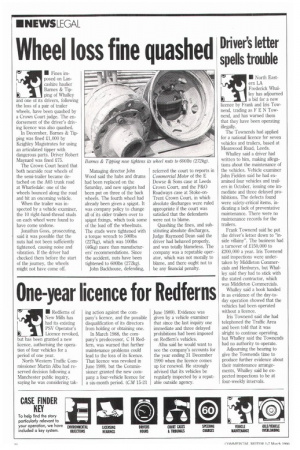Dr
Page 22

If you've noticed an error in this article please click here to report it so we can fix it.
Wheel loss fine quashed e o be
sivleesrle pls trouble
• Fines imposed on Lancashire haulier Barnes & Tipping of Whalley and one oi its drivers, following the loss of a pair of trailer wheels, have been quashed by a Crown Court judge. The endorsement of the driver's driving licence was also quashed.
In December, Barnes & 'ripping was fined £1,000 by Keighley Magistrates for using an articulated tipper with dangerous parts. Driver Robert Maynard was fined £75.
The Crown Court heard that both nearside rear wheels of the semi-trailer became detached on the A65 trunk road at Wharfedale: one of the wheels bounced along the road and hit an oncoming vehicle.
When the trailer was inspected by a vehicle examiner, the 10 right-hand-thread studs on each wheel were found to have come undone.
Jonathan Goss, prosecuting, said it was possible that the nuts had not been sufficiently tightened, causing noise and vibration. If the driver had checked them before the start of the journey, the wheels might not have come off. Managing director John Wood said the hubs and drams had been replaced on the Saturday, and new spigots had been put on three of the back wheels. The fourth wheel had already been given a spigot. It was company policy to change all of its older trailers over to spigot fixings, which took some of the load off the wheelnuts. The studs were tightened with a torque wrench to 500Ibs (227kg), which was 100lbs (46kg) more than manufacturers' recommendations. Since the accident, nuts have been tightened to 600Ibs (272kg).
John Backhouse, defending,
referred the court to reports in Commercial Motor of the E Dowse & Sons case at Leeds Crown Court, and the P&O Roadways case at Stoke-onTrent Crown Court, in which absolute discharges were ruled appropriate if the court was satisfied that the defendants were not to blame.
Quashing the fines, and substituting absolute discharges, Judge Raymond Dean said the driver had behaved properly, and was totally blameless. The company was a reputable operator, which was not morally to blame, and there ought not to be any financial penalty.








































































































































